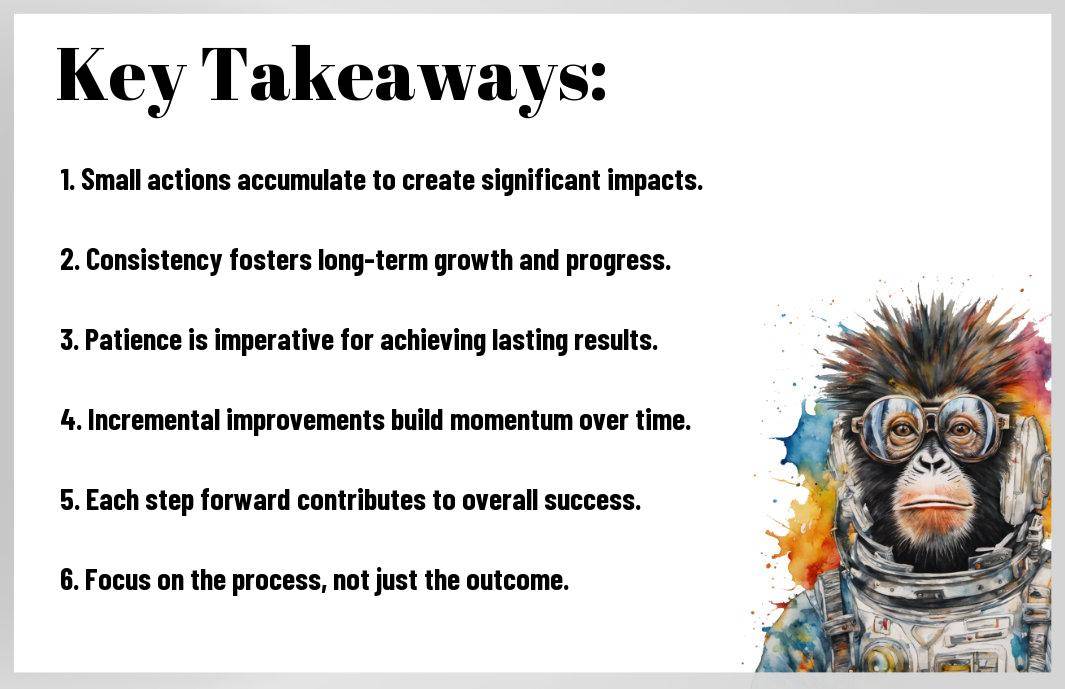Most of us underestimate the power of persistence in achieving our goals. I’ve discovered that small, consistent actions can lead to significant transformations in various aspects of life, from productivity to health. By focusing on incremental improvements, you can create a momentum that drives change over time. This approach makes it easier to stay committed and can lead to remarkable results. If you’re seeking inspiration on how to build better habits, check out this article on How Small Habits Can Lead to Big Changes, and explore the impact of persistence in your journey.
Key Takeaways:
- Consistency: Regularly engaging in small actions reinforces habits and leads to steady progress.
- Compound effect: Minor changes can accumulate over time, resulting in significant transformations in various aspects of life.
- Mindset shift: Embracing the idea of small steps encourages a more sustainable approach to achieving long-term goals.
- Focus on process: Concentrating on daily actions rather than overwhelming long-term results can enhance motivation.
- Resilience: Persistence through challenges is key, as every small effort contributes to eventual success.
- Incremental improvement: Taking small steps allows for adjustments and refinements along the way, leading to better outcomes.
- Empowerment: Understanding that one’s actions can lead to change fosters a sense of control and agency in personal or professional development.

Understanding Persistence
To truly grasp the concept of persistence, I believe it’s crucial to recognize it as a vital trait that fuels effective change and long-term success. When you commit to small, consistent actions, you cultivate resilience, enabling yourself to face challenges head-on. This journey requires patience and the understanding that gradual progress can lead to significant outcomes over time.
The Psychological Basis of Persistence
For many, persistence stems from a deep-seated belief in one’s ability to overcome obstacles. This psychological foundation manifests as a willingness to endure hardships and setbacks without losing sight of your goals. Cultivating this mindset can empower you to maintain your determination, even when faced with difficulties.
The Role of Motivation in Sustained Effort
To experience sustained effort, it is imperative to find your own sources of motivation. Without a clear purpose or passion guiding your actions, persistence may wane. This is where understanding your unique motivations can play a significant part in driving you forward.
Role of motivation in persistence cannot be underestimated. I have noticed that when your motivations align with your goals, it amplifies your commitment to sustained effort. Strong intrinsic motivations, like personal growth or passion, tend to yield more lasting engagement than external factors. When you face challenges, those internal desires provide a profound sense of purpose, making it easier to push through obstacles. Conversely, external motivators, such as rewards or recognition, can fade over time, potentially jeopardizing your long-term success if relied upon too heavily. Embracing and nurturing your inner drive will support your persistence journey immensely.
The Power of Small Actions
While we often seek immediate results, the true strength of change lies in the small actions we take daily. These seemingly insignificant steps can accumulate, eventually leading to remarkable transformations over time. By consistently engaging in these minor efforts, I’ve witnessed how they can create a ripple effect, influencing not just my own life but also those around me.
Incremental Progress and the Compound Effect
Progress is rarely instantaneous; instead, it builds gradually through repeated, intentional actions. The compound effect illustrates how small, consistent efforts compound over time, leading to substantial advancements in various areas of life. When you commit to making tiny changes, whether in productivity, health, or personal development, you’ll find that the outcomes can be undeniably powerful.
Examples of Small Actions Leading to Big Changes
Small actions often pave the way for significant transformations, and I can share various instances that demonstrate this principle. Simple habits like drinking a glass of water each morning or reading a few pages of a book daily can dramatically improve your overall health and knowledge over time. When you consistently integrate such minor adjustments into your routine, the long-term benefits can be profound.
Another example includes committing to a daily 15-minute walk. At first, it might seem trivial, but consistently incorporating this small action into your life can enhance your physical fitness, boost mental clarity, and foster a positive mindset. I’ve seen others transform their lives by adopting simple practices, such as writing down three things they are grateful for each day, which can fundamentally shift your outlook on life. These small steps not only promote better habits but also motivate continued progress towards larger goals.

Overcoming Obstacles
Many individuals face challenges on their journey toward persistence. These obstacles can range from self-doubt to external pressures that make it hard to stay committed to your goals. Understanding that setbacks and challenges are a natural part of progress is vital. I encourage you to view these hurdles not as permanent roadblocks but as opportunities to develop resilience and find new strategies to keep moving forward.
Common Barriers to Consistent Action
Between busy schedules, lack of motivation, and negative thoughts, many barriers can hinder your ability to take consistent action. Often, these obstacles stem from a fear of failure or perfectionism, leading to procrastination or abandonment of goals. Identifying these barriers is the first step in overcoming them and can help you pave the way for a more productive and fulfilling journey.
Strategies for Maintaining Persistence
Between setting clear, achievable goals and embracing a growth mindset, there are effective strategies to maintain your persistence. Breaking down your objectives into smaller, manageable tasks can help sustain motivation and provide a sense of accomplishment. Scheduling regular check-ins with yourself to evaluate your progress can also keep you accountable and on track.
For instance, creating a daily or weekly routine that incorporates your goals helps build a strong habit. Schedule specific times for action to ensure you prioritize these tasks amidst the distractions of daily life. In doing so, you’ll nourish your drive and build a positive feedback loop, leading to more significant progress. Additionally, surrounding yourself with supportive individuals who share similar goals can reinforce your commitment and provide much-needed encouragement. Focusing on your progress, rather than perfection, can transform obstacles into stepping stones, making persistence not just a goal but a lifestyle.
Cultivating a Mindset for Change
After acknowledging that change is a process, I encourage you to cultivate a mindset that embraces growth and transformation. This involves shifting your perspective to see challenges as opportunities for learning. By developing a consistent practice of small actions, you can foster a sense of capability and confidence that empowers you to navigate the ups and downs of your journey toward change.
Developing Resilience and Patience
Resilience is the key to overcoming obstacles and setbacks. By understanding that change doesn’t happen overnight, I find that nurturing patience allows me to stay focused on my long-term goals. When you encounter difficulties, it’s important to remain committed to your path, knowing that every step, no matter how small, contributes to your overall progress.
The Importance of Self-Reflection
Behind every successful transformation is a commitment to self-reflection. This process allows me to examine my thoughts, behaviors, and emotions, guiding my journey toward change. By taking the time to analyze what works and what doesn’t, I develop a stronger sense of self-awareness, which empowers my actions and decisions moving forward. In turn, this practice helps me identify patterns of success and areas needing improvement, ensuring that I stay aligned with my goals.
Developing a regular practice of self-reflection not only fosters self-awareness but also enhances your ability to adapt. It’s easy to get caught up in the hustle of day-to-day life, but taking a step back to evaluate your progress can reveal valuable insights. This allows you to shift strategies when necessary and recognize your achievements, no matter how small, reinforcing a positive mindset. Embrace self-reflection as a tool for growth; your journey toward change will be more rewarding and effective.

Real-Life Applications
Not only do small actions contribute to monumental change, but they also teach us about the power of persistence. For an insightful examine this phenomenon, check out How is it that Small Actions can Create HUGE Change?. By embracing persistence in your daily life, you can unlock the potential for extraordinary transformations.
Persistence in Personal Development
Persistence is the cornerstone of personal growth. By committing to small daily habits, such as reading a few pages or practicing mindfulness, I have seen my skills and emotional resilience flourished. Over time, these tiny steps accumulate, and before you know it, you realize significant progress in your personal journey.
Persistence in Professional Growth
Behind every successful professional is a story of persistence. You might feel overwhelmed by the competitive nature of your field, but taking consistent actions like networking, skill development, or seeking feedback can set you apart. Each small effort contributes to building your expertise and credibility over time.
RealLife examples abound in professional growth. Consider the powerful impact of attending even one industry event or tackling a new project at work. These endeavors may seem modest initially, but their recurring nature can lead to powerful connections and opportunities. If you stay focused, your small efforts in networking and acquiring new skills can lead to greater visibility and undeniable advancement in your career, opening doors that you may have thought were beyond your reach.
Conclusion
Following this journey of understanding persistence, I realize that small actions can truly lead to big changes over time. When I commit to consistent, little efforts, I can transform my goals into reality. Whether it’s daily habits or minor adjustments, each step builds momentum. You can explore more about the impact of these small efforts in my reading on Small Actions Lead to Big Results. Embrace the power of persistence, and watch how your life evolves.
FAQ
Q: What does “small actions can lead to big changes over time” mean?
A: This phrase emphasizes that consistent, incremental efforts can accumulate and result in significant transformation. Rather than relying on major actions or quick fixes, it highlights the importance of sustained activity, no matter how minor, in achieving substantial outcomes over time.
Q: How can I apply the concept of persistence in my daily life?
A: To incorporate persistence into your routine, start by setting achievable goals and breaking them down into smaller tasks. Focus on completing one small task each day, which will gradually build momentum and move you closer to your larger objective. Celebrate minor victories to maintain motivation.
Q: Why is it important to focus on small actions instead of big goals?
A: Focusing on small actions reduces the feeling of overwhelm that can come with tackling big goals. It makes the process more manageable and allows for adjustments along the way. Small steps encourage continuous progress and foster a sense of accomplishment, which can enhance motivation and commitment.
Q: Can you provide examples of small actions that lead to big changes?
A: Absolutely! Examples include committing to reading just a few pages of a book each day, exercising for 10 minutes daily, or saving a small amount of money each week. Over time, these small actions can lead to expanded knowledge, improved fitness levels, or significant savings, respectively.
Q: How do I stay motivated to keep taking small actions?
A: Keeping motivation high involves setting clear intentions and tracking your progress. Maintain a journal of your small achievements, surround yourself with supportive individuals, and remind yourself of the longer-term vision you’re working towards. You might also incorporate rewards for hitting certain milestones to keep things engaging.
Q: Are there any pitfalls to relying solely on small actions for progress?
A: While small actions are beneficial, it’s vital to align them with a broader strategy. It can be easy to become complacent or distracted if one only focuses on small actions without the context of overall goals or timelines. Periodically reviewing your progress and adjusting your actions can ensure that you are staying on track without losing sight of larger objectives.
Q: How does patience tie into the idea of persistence with small actions?
A: Patience is fundamental as it takes time to see the results of consistent small actions. Accepting that change is a gradual process helps to cultivate resilience. Embracing patience allows you to stay committed without becoming discouraged when immediate results are not visible. Understanding that significant change is often the result of numerous small efforts can reinforce your dedication over time.



